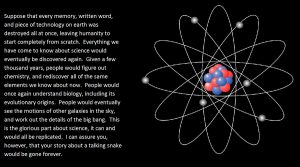Atheist Memes: Would Science Survive Past Christianity?



Atheists love to exalt science and put down Christianity. Of course I’m all for lifting up science; it’s that second half that bothers me. Atheists also like to portray themselves as the ones who live by reason and evidence, not “blind faith.” But how well do they do at that? This atheist meme is a good place to test that.
Suppose all knowledge were wiped out, the meme begins, but the human race survived to start over. Give us a few thousand years and we’d re-discover all of today’s science. “I can assure you,” though, it closes, Christianity’s “story of a talking snake would be gone forever.”
Does that seem sensible? It isn’t. Problems abound.
Arguing Against the Weakest Point
 godlessmom.com
godlessmom.com(Click to enlarge)
Let’s start with the key that unlocks the rest: “your story of a talking snake.” This is called arguing against the opponent’s weakest position. Christianity has no outside evidence for the serpent in the Garden of Eden; nothing except the account in Genesis 3, along with some New Testament echoes. And it certainly looks far-fetched on the face of it.
Yet it’s a very short account, with no elaboration or explanation. There’s room for lot more in it than what appears on the surface. Still, yes, this is one of the very weakest links to supporting the truth of our faith.
Suppose instead, though, the meme had said, “your story of a dying and rising God would be gone forever.” That would be arguing against our strong point. They didn’t do that for some reason — maybe because there’s lots of evidence in history for Jesus’ resurrection. He really did rise from the grave. It happened in real history, and it’s good news for us who still live in real history.
Arguing Based On Personal Opinion
This meme’s what-if about human knowledge dying off and starting over isn’t real history. But suppose it were to become that way. The worlds’ real history would still be real. That real history would still include the same story of humanity’s creation, fall and ultimate redemption. Above all it would still include God, who has already told us His own story in His word, and would have every opportunity to tell it again.
Help us champion truth, freedom, limited government and human dignity. Support The Stream »
What this meme supposes, obviously, is that none of that is true. Therefore if all humanity had to start over again, it would have to do it without God. Which is simply to say that the meme’s writer doesn’t believe in God today.
So if this an argument against God, it’s a lousy one. It begins with the hidden assumption, “I don’t believe in God, so this is what I think would happen if …” Arguments of that form are nothing but personal opinion, wrapped up in fancy impressive clothes.
Why Would Science Start Again, Anyway?
But there’s a further twist that makes this even more interesting. What does it take for science to start? What did it take for it to get rolling the first time?
Consider how much effort and dedication science requires. Research is costly, both in time and money. The world spent an estimated $1 trillion on science in 2010 alone. Plenty of experiments succeed by showing the scientist she was on the wrong track, so she has to back up and start over again. Why would anyone even do science?
Today the answer is easy: Because we know it works. What about at the beginning of science, though, before anyone knew how much it could do?
Most of the world, throughout most of human history, had little reason to expect science to work. They hadn’t seen it work. Their religions and philosophies didn’t expect nature to be rational. The gods played with nature, they thought, and they played with human lives and minds as well. There was no point in putting time or energy in trying to understand them. There wasn’t even any point in trying to improve humanity’s lot, since most people of the earth expected nothing would ever change. What had been would always be.
Christianity’s Crucial Role
Still science got started, in spite of the costs and in spite of the risks. Where? In Christian Europe, and only in Christian Europe. Early scientists owed something to Greek and Islamic thinkers, but those Greeks and Muslims didn’t produce much science themselves.
What it finally took (many thinkers argue) was a view of reality in which God cared about His creation, not only to make it but to walk right into it, in the person of our Lord Jesus Christ. Therefore Christians, too, can have regard for the natural world God created. It also took a view of God wise and rational, a view which led early scientists to expect His creation to mirror His rational ways.
Indeed, science in its early days was almost entirely the product not just of Christians, but of Christian clergy! And Christians have played central roles in science ever since.
Would science start up all over again? Not unless people knew it was worth pursuing — which real history shows us depended a lot on Christianity.
Part of a series on atheist memes.
Tom Gilson is a senior editor with The Stream and the author of Critical Conversations: A Christian Parents’ Guide to Discussing Homosexuality with Teens


